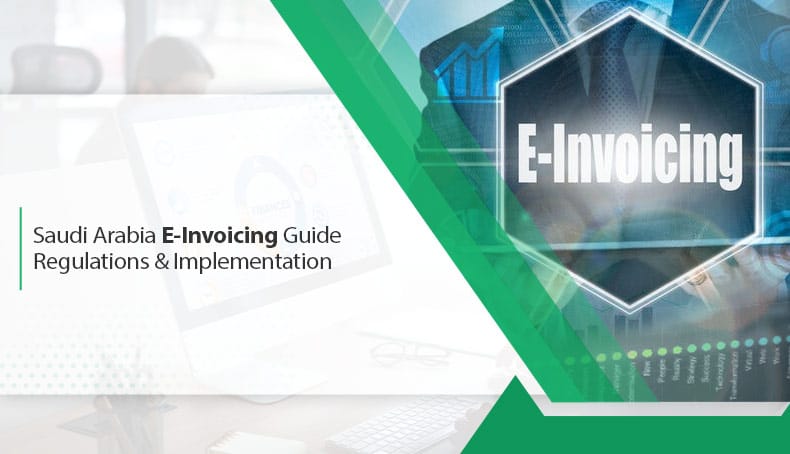E-invoicing, to begin with, involves creating invoices using a digital format. In turn, it allows consumers to issue and store them electronically. Subsequently, on December 4, 2021, ZATCA implemented regulations requiring businesses to adopt an e-invoicing process in two phases. For instance, for KSA VAT taxpayers, e-invoices will resemble the VAT tax invoices typically issued through an online system. Therefore, businesses must ensure they meet the requirements set by ZATCA. A paper invoice is not considered an e-invoice. Once issued, an e-invoice cannot be edited. However, you can issue electronic notes. This should be issued about the original invoice that was issued. For example, if your purchaser has returned your product, you cannot modify the original invoice, but you can issue a credit note through the e-invoicing system.
Hence, all your invoicing and note-issuing transactions must be shown through a similar e-invoicing system and comply with ZATCA’s regulations. This blog will explore the implementation and regulation of ZATCA E-invoicing in KSA.
E-Invoicing Implementation Phases
The rollout of e-invoicing in Saudi Arabia is structured in two primary phases:
- Phase One: Generation Phase
- Prerequisite: Taxpayers are required to produce and store electronic invoices, along with associated notes, in a structured electronic format.
- Objective: Evolution from paper-based to electronic invoicing systems to boost efficiency and decrease errors.
- Phase Two: Integration Phase
- Conditions: Taxpayers must integrate their E‑invoicing solution with ZATCA’s Fatoora Portal for real-time transmission and validation of invoices.
- Objective: Enable seamless communication between taxpayers’ systems and ZATCA to ensure compliance and facilitate monitoring.
Step-by-Step Guide on ZATCA E-Invoicing Phase 2 Integration
Taxpayers, for whom ZATCA e‑invoicing Phase 2 is applicable, shall follow the steps below.
- ZATCA Taxpayers shall log in to the ZATCA Portal using the credentials used for VAT and Zakat Filing.
- The taxpayer shall produce OTP Codes for Solutions to integrate.
- The taxpayer shall utilize the OTP Code for onboarding the EGS
- The Taxpayer can access the Fatoora portal if EGS is onboarded.
Why is KSA e-invoicing software being introduced?
o KSA E-invoicing, first of all, involves creating, issuing, and saving digital invoices online. To comply with regulations, ZATCA mandates e-invoicing in two stages, starting December 4, 2021. Specifically, e-invoices for VAT taxpayers are generated online using KSA e-invoice software and, in essence, resemble regular VAT invoices. As such, businesses must adapt to the digital format to remain compliant.
o Scanned paper invoices are not limited. Once issued, e-invoices cannot be amended; however, electronic debit and credit notes can be generated through e-invoice software if they comply with VAT regulations. For example, a credit note can be issued if a purchaser returns a product.
o All invoicing and note-issuing transactions must, therefore, use KSA e-invoice software to ensure both reliability and data security. In fact, e-invoices are mandatory for domestic sales, exports, and advance payments. However, they are not required for VAT-exempt supplies, imports, or transactions subject to the reverse charge mechanism. As a result, businesses must clearly distinguish between mandatory and exempt cases to remain compliant.
Using KSA e-invoice software modernizes the procedure, ensuring that all transactions comply with ZATCA e-invoicing rules and that data is stored securely.
Fatoora Platform
Central to the e-invoicing initiative is the Fatoora Platform, developed by ZATCA e‑invoicing. This platform serves as the hub for managing e-invoicing processes, including:
- Onboarding E-Invoice Generation Solutions (EGS): Businesses register their e-invoicing systems with ZATCA to obtain Cryptographic Stamp Identifiers (CSIDs), ensuring the authenticity and integrity of each invoice.
- CSID Management: The platform facilitates the renewal, revocation, and oversight of CSIDs, ensuring the security of the invoicing process.
- Integration Support: Provides resources and documentation to assist businesses in aligning their systems with ZATCA’s requirements.
Compliance Requirements
To adhere to E‑invoicing compliance regulations, businesses must confirm their systems can:
Produce structured invoices in a digital format with electronic processing and integration.
It must include Compulsory Fields. Each invoice must contain specific information as specified by ZATCA, such as the seller’s details, tax amounts, and a unique invoice identifier.
It comes with incorporated security Features. Invoices should be well-equipped with features such as QR codes and digital signatures to authenticate their validity and prevent tampering.
KSA’s E-invoicing Guidelines
- All taxable goods and services are subject to VAT and will be covered by the e-invoicing requirements.
- The e-invoicing process must be used by all Saudi Arabia VAT e‑invoicing business owners in KSA who conduct both domestic and international business. It will also be obligatory for you to implement the e-invoicing procedure if you are a third party in Saudi Arabia, sending a tax invoice on behalf of a taxable person. Thus, these rules will be implemented in an accounting company that bills textile sellers on their behalf.
- All transactions must be in e-invoicing format. A printed copy of the invoice will be sent to the purchaser, along with the electronic version.
- The bills must be written in Arabic. The e-invoice must also be sent in Arabic.
Is Saudi Arabia’s e-invoicing system functioning?
E-invoicing and traditional invoicing are parallel processes. The procedure remains unchanged, but the e-invoice is carried out more securely.
Ensure the Automated e‑invoicing includes all essential fields by using a compliant e-invoicing system.
Deliver a copy to the buyer. Before distributing the invoice to the buyer, you must submit it to ZATCA’s portal by step 2 and have it authenticated.
For forthcoming use, save the electronic invoice on your system. Storing will be shortened, and compliance will be automatically confirmed by switching to a cloud-based system that provides electronic invoicing benefits.
Non-Compliance Penalties
KSA VAT compliance is mandatory for consumers. If they did not comply with e-invoicing regulations, it could result in noteworthy penalties, including fines fluctuating from SAR 5,000 to SAR 50,000 for violations such as:
- Not issuing electronic invoices.
- Neglecting compulsory information.
- Consuming non-compliant systems.
Recurrent offenses may result in augmented fines and additional legal consequences.
E-invoicing for Taxpayers’ Benefits
- It will provide a better experience for vendors and purchasers. When you issue invoices promptly, input tax credits will be managed more proficiently.
- Electronic data will be more secure than paper entries. With a proper system for validating invoices, there will be fewer chances of fraud, leading to improved trade.
- A streamlined electronic invoicing process decreases slip-ups and extra hassles for business owners. Your workload gets compact, you get paid quicker, and you can save documents easily when storing them numerically.
To comply with the rules, every resident taxpayer must be prepared for KSA e-invoicing procedures. Furthermore, you need to know about the KSA VAT e‑invoicing regulations for the future.
Conclusion
The implementation of e‑invoicing in Saudi Arabia marks a significant advancement in the nation’s financial and tax infrastructure. With the advent of these systems, businesses can ensure adherence to regulations while improving operational efficiency and reducing administrative burdens. For detailed guidelines and updates, companies are encouraged to consult ZATCA’s official resources and the Fatoora Portal.






